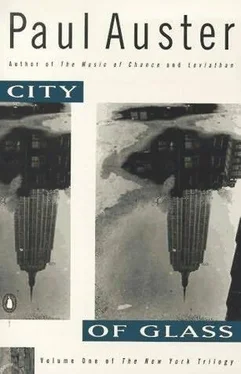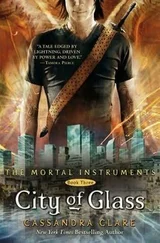Paul Auster - City of Glass
Здесь есть возможность читать онлайн «Paul Auster - City of Glass» весь текст электронной книги совершенно бесплатно (целиком полную версию без сокращений). В некоторых случаях можно слушать аудио, скачать через торрент в формате fb2 и присутствует краткое содержание. Жанр: Современная проза, на английском языке. Описание произведения, (предисловие) а так же отзывы посетителей доступны на портале библиотеки ЛибКат.
- Название:City of Glass
- Автор:
- Жанр:
- Год:неизвестен
- ISBN:нет данных
- Рейтинг книги:5 / 5. Голосов: 1
-
Избранное:Добавить в избранное
- Отзывы:
-
Ваша оценка:
- 100
- 1
- 2
- 3
- 4
- 5
City of Glass: краткое содержание, описание и аннотация
Предлагаем к чтению аннотацию, описание, краткое содержание или предисловие (зависит от того, что написал сам автор книги «City of Glass»). Если вы не нашли необходимую информацию о книге — напишите в комментариях, мы постараемся отыскать её.
City of Glass — читать онлайн бесплатно полную книгу (весь текст) целиком
Ниже представлен текст книги, разбитый по страницам. Система сохранения места последней прочитанной страницы, позволяет с удобством читать онлайн бесплатно книгу «City of Glass», без необходимости каждый раз заново искать на чём Вы остановились. Поставьте закладку, и сможете в любой момент перейти на страницу, на которой закончили чтение.
Интервал:
Закладка:
For a day or two this tactic was mildly successful, but eventually even Auster began to droop from the monotony. Quinn realized that he needed something more to keep himself occupied, some little task to accompany him as he went about his work. In the end, it was the red notebook that offered him salvation. Instead of merely jotting down a few casual comments, as he had done the first few days, he decided to record every detail about Stillman he possibly could. Using the pen he had bought from the deaf mute, he set about his task with diligence. Not only did he take note of Stillman's gestures, describe each object he selected or rejected for his bag, and keep an accurate timetable for all events, but he also set down with meticulous care an exact itinerary of Stillman's divagations, noting each street he followed, each turn he made, and each pause that occurred. In addition to keeping him busy, the red notebook slowed Quinn's pace. There was no danger now of overtaking Stillman. The problem, rather, was to keep up with him, to make sure he did not vanish. For walking and writing were not easily compatible activities. If for the past five years Quinn had spent his days doing the one and the other, now he was trying to do them both at the same time. In the beginning he made many mistakes. It was especially difficult to write without looking at the page, and he often discovered that he had written two or even three lines on top of each other, producing a jumbled, illegible palimpsest. To look at the page, however, meant stopping, and this would increase his chances of losing Stillman. After a time, he decided that it was basically a question of position. He experimented with the notebook in front of him at a forty-five-degree angle, but he found his left wrist soon tired. After that, he tried keeping the notebook directly in front of his face, eyes peering over it like some Kilroy come to life, but this proved impractical. Next, he tried propping the notebook on his right arm several inches above his elbow and supporting the back of the notebook with his left palm. But this cramped his writing hand and made writing on the bottom half of the page impossible. Finally, he decided to rest the notebook on, his left hip, much as an artist holds his palette. This was an improvement. The carrying no longer caused a strain, and his right hand could hold the pen unencumbered by other duties. Although this method also had its drawbacks, it seemed to be the most comfortable arrangement over the long haul. For Quinn was now able to divide his attention almost equally between Stillman and his writing, glancing now up at the one, now down at the other, seeing the thing and writing about it in the same fluid gesture. With the deaf mute's pen in his right hand and the red notebook on his left hip, Quinn went on following Stillman for another nine days.
His nightly conversations with Virginia Stillman were brief. Although the memory of the kiss was still sharp in Quinn's mind, there had been no further romantic developments. At first, Quinn had expected something to happen. After such a promising start, he felt certain that he would eventually find Mrs. Stillman in his arms. But his employer had rapidly retreated behind the mask of business and not once had referred to that isolated moment of passion. Perhaps Quinn had been misguided in his hopes, momentarily confusing himself with Max Work, a man who never failed to profit from such situations. Or perhaps it was simply that Quinn was beginning to feel his loneliness more keenly. It had been a long time since a warm body had been beside him. For the fact was, he had started lusting after Virginia Stillman the moment he saw her, well before the kiss took place. Nor did her current lack of encouragement prevent him from continuing to imagine her naked. Lascivious pictures marched through Quinn's head each night, and although the chances of their becoming real seemed remote, they remained a pleasant diversion. Much later, long after it was too late, he realized that deep inside he had been nurturing the chivalric hope of solving the case so brilliantly, of removing Peter Stillman from danger so swiftly and irrevocably, that he would win Mrs. Stillman's desire for as long he wanted it. That, of course, was a mistake. But of all the mistakes Quinn made from beginning to end, it was no worse than any other.
It was the thirteenth day since the case had begun. Quinn returned home that evening out of sorts. He was discouraged, ready to abandon ship. In spite of the games he had been playing with himself, in spite of the stories he had made up to keep himself going, there seemed to be no substance to the case. Stillman was a crazy old man who had forgotten his son. He could be followed to the end of time, and still nothing would happen. Quinn picked up the phone and dialed the Stillman apartment.
"I'm about ready to pack it in," he said to Virginia Stillman. "From all I've seen, there's no threat to Peter."
"That's just what he wants us to think," the woman answered. "You have no idea how clever he is. And how patient."
"He might be patient, but I'm not. I think you're wasting your money. And I'm wasting my time."
"Are you sure he hasn't seen you? That could make all the difference.
"I wouldn't stake my life on it, but yes, I'm sure."
"What are you saying, then?"
"I'm saying you have nothing to worry about. At least for now. If anything happens later, contact me. I'll come running at the first sign of trouble."
After a pause Virginia Stillman said, "You could be right." Then, after another pause, "But just to reassure me a little, I wonder if we could compromise."
"It depends on what you have in mind."
"Just this. Give it a few more days. To make absolutely certain.
"On one condition," said Quinn. "You've got to let me do it in my own way. No more restraints. I have to be free to talk to him, to question him, to get to the bottom of it once and for all."
"Wouldn't that be risky?"
"You don't have to worry. I'm not going to tip our hand. He won't even guess who I am or what I'm up to."
"How will you manage that?"
"That's my problem. I have all kinds of tricks up my sleeve. You just have to trust me."
"All right, I'll go along. I don't suppose it will hurt."
"Good. I'll give it a few more days, and then we'll see where we stand.
"Mr. Auster?"
"Yes?"
"I'm terribly grateful. Peter has been in such good shape these past two weeks, and I know it's because of you. He talks about you all the time. You're like… I don't know… a hero to him."
"And how does Mrs. Stillman feel?"
"She feels much the same way."
"That's good to hear. Maybe someday she'll allow me to feel grateful to her."
"Anything is possible, Mr. Auster. You should remember that."
"I will. I'd be a fool not to."
Quinn made a light supper of scrambled eggs and toast, drank a bottle of beer, and then settled down at his desk with the red notebook. He had been writing in it now for many days, filling page after page with his erratic, jostled hand, but he had not yet had the heart to read over what he had written. Now that the end at last seemed in sight, he thought he might hazard a look.
Much of it was hard going, especially in the early parts. And when he did manage to decipher the words, it did not seem to have been worth the trouble. "Picks up pencil in middle of block. Examines, hesitates, puts in bag… Buys sandwich in deli… Sits on bench in park and reads through red notebook." These sentences seemed utterly worthless to him.
It was all a question of method. If the object was to understand Stillman, to get to know him well enough to be able to anticipate what he would do next, Quinn had failed. He had started with a limited set of facts: Stillman's background and profession, the imprisonment of his son, his arrest and hospitalization, a book of bizarre scholarship written while he was supposedly still sane, and above all Virginia Stillman's certainty that he would now try to harm his son. But the facts of the past seemed to have no bearing on the facts of the Present. Quinn was deeply disillusioned. He had always imagined that the key to good detective work was a close observation of details. The more accurate the scrutiny, the more successful the results. The implication was that human behavior could be understood, that beneath the infinite facade of gestures, tics, and silences, there was finally a 'Coherence, an order, a source of motivation. But after struggling to take in all these surface effects, Quinn felt no closer to Stillman than when he first started following him. He had lived Stillman's life, walked at his pace, seen what he had seen, and the only thing he felt now was the man's impenetrability. Instead of narrowing the distance that lay between him and Stillman, he had seen the old man slip away from him, even as he remained before his eyes.
Читать дальшеИнтервал:
Закладка:
Похожие книги на «City of Glass»
Представляем Вашему вниманию похожие книги на «City of Glass» списком для выбора. Мы отобрали схожую по названию и смыслу литературу в надежде предоставить читателям больше вариантов отыскать новые, интересные, ещё непрочитанные произведения.
Обсуждение, отзывы о книге «City of Glass» и просто собственные мнения читателей. Оставьте ваши комментарии, напишите, что Вы думаете о произведении, его смысле или главных героях. Укажите что конкретно понравилось, а что нет, и почему Вы так считаете.












